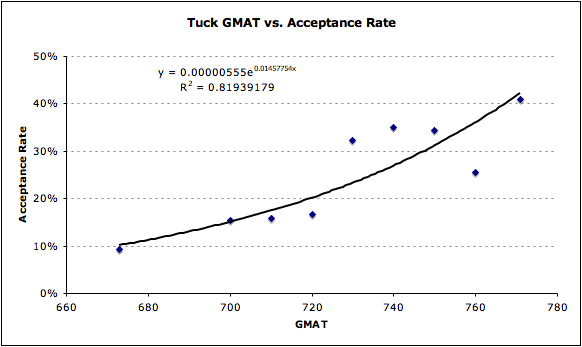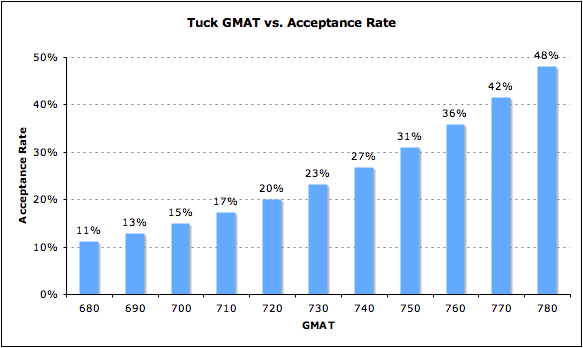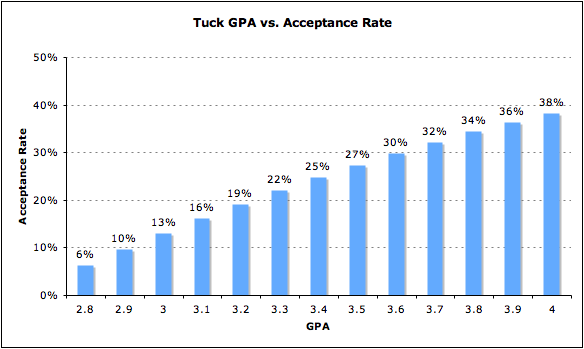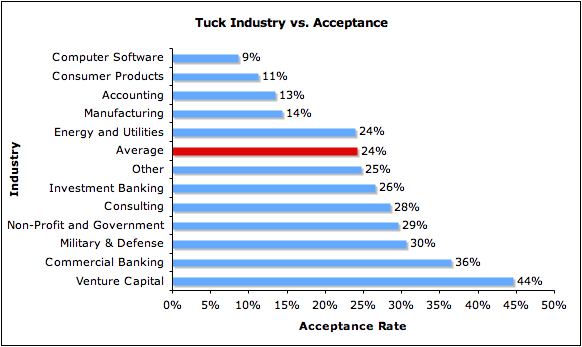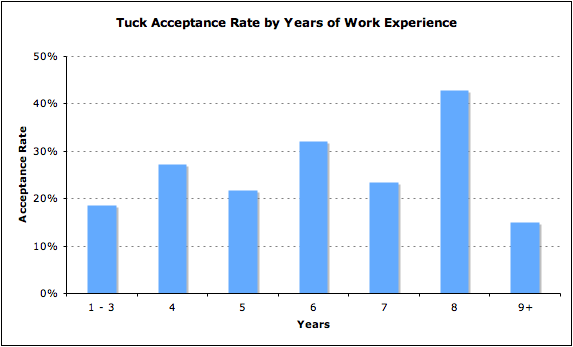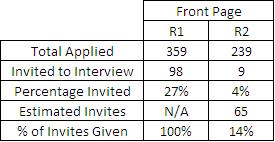With round 2 application deadlines rapidly approaching, many applicants may wonder what their chance of getting an MBA interview with their favorite schools is. I analyzed the MBA interview probability for the top 25 schools over the past 5 years by GMAT and GPA. Unsurprisingly, for most schools the MBA interview chance increased for high GMAT and high GPA candidates. Continue reading
Tag Archives: Interview
MBA Interview Acceptance Rate by GMAT and GPA
The interview is a crucial component of the MBA admission process. All top full-time MBA programs interview applicants before admitting them. Generally the MBA admissions committee is looking for two things during the interview, that you fit the culture of the school and that you have the emotional intelligence to succeed at business school. I have already looked at MBA Interview acceptance rate by itself. However, I always wondered when applying to business school if all applicants are considered equal after they have been invited to interview or does the rest of the application, like the GMAT and GPA, still matter. It turns out that it matters at some schools and not at others. Continue reading
Kellogg Interview Questions
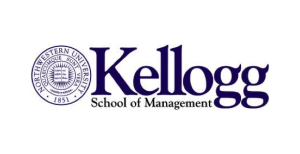 Kellogg is somewhat unique in that it allows anyone who applies to interview. Kellogg MBA interviews are typically off-campus with an alumnus, although it is also possible to interview with an admissions committee member on campus or over Skype. Interviews with Kellogg tend to vary greatly based on who interviews you. You can expect anywhere from 6 to 14 Kellogg interview questions. Kellogg interviews are on the longer side, sometimes lasting an hour to an hour and a half. If you are interviewed by an alumni, typically they will have already read your resume but not your whole application. Below are the most common Kellogg interview questions, ranked from most to least common. Your chance of being asked each questions is in parenthesis. Continue reading
Kellogg is somewhat unique in that it allows anyone who applies to interview. Kellogg MBA interviews are typically off-campus with an alumnus, although it is also possible to interview with an admissions committee member on campus or over Skype. Interviews with Kellogg tend to vary greatly based on who interviews you. You can expect anywhere from 6 to 14 Kellogg interview questions. Kellogg interviews are on the longer side, sometimes lasting an hour to an hour and a half. If you are interviewed by an alumni, typically they will have already read your resume but not your whole application. Below are the most common Kellogg interview questions, ranked from most to least common. Your chance of being asked each questions is in parenthesis. Continue reading
Cornell MBA Interview Questions
 This guide is designed to help Johnson MBA applicants to prepare for their interview, complete with a list of the most common Cornell MBA interview questions. The typical Johnson MBA interview is 30 to 50 minutes long. It can be given by either a second year student, alumni or an admissions committee member. It is even possible to get an interview with an adcom member while a second year student is observing for interview training purposes. Interviews can take place on campus, off-campus or over Skype. Expect the interview to be semi-blind, which means that they have seen your resume but probably nothing else. The Cornell MBA interview questions below are organized from most common question to least common, with the frequency it is asked in parenthesis.
This guide is designed to help Johnson MBA applicants to prepare for their interview, complete with a list of the most common Cornell MBA interview questions. The typical Johnson MBA interview is 30 to 50 minutes long. It can be given by either a second year student, alumni or an admissions committee member. It is even possible to get an interview with an adcom member while a second year student is observing for interview training purposes. Interviews can take place on campus, off-campus or over Skype. Expect the interview to be semi-blind, which means that they have seen your resume but probably nothing else. The Cornell MBA interview questions below are organized from most common question to least common, with the frequency it is asked in parenthesis.
Most Common Cornell MBA Interview Questions
1) Tell me about yourself or walk me through your resume. (80%)
2) Tell me about a challenging situation at work or a work conflict. (70%)
3) Why Johnson? (70%)
4) Why get an MBA? Why now? (60%)
5) How will you contribute to Johnson? (50%)
6) What are your post MBA plans or goals? (50%)
7) Describe a time when you managed or lead other people? (50%)
8) What are your biggest weakness? (40%)
9) Why did you make XYZ transition? (20%)
10) What is your leadership style? (20%)
11) Have you applied to any other schools? What do they have in common with Johnson? (20%)
12) Is there anything else you want me to know? (20%)
At the end you will have time to ask a few questions. For additional interview tips check out my MBA interview preparation guide. This guide was created using the Johnson interview reports from clear admit.
Stern Interview Preparation Guide
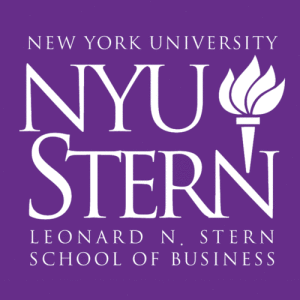 Stern Interviewed me back in December 2013. I am happy to say that I was accepted. I used Clear Admit to prepare, and it was very helpful. I felt ready and don’t remember being caught off guard by any questions. I have created a list of the most common questions you can expect during a Stern interview because I want to help all of my potential future classmates. Most Stern interviews are around 30 minutes and conducted by an admissions staff member who has read your full application. My first question was about a unique activity that I participate in that I mentioned in the application. When you arrive, you will receive a folder with information about clubs/programs you mentioned you would be interested in. You will also be given a Stern shirt so you can show your pride if you are admitted. My Stern interview was right before winter break so I didn’t hear back for almost 3 weeks, but often candidates get their decision in as little as a few days. Don’t forget to bring a copy of your transcripts, your application cannot proceed without them. I forgot mine and had to overnight them when I got back home.
Stern Interviewed me back in December 2013. I am happy to say that I was accepted. I used Clear Admit to prepare, and it was very helpful. I felt ready and don’t remember being caught off guard by any questions. I have created a list of the most common questions you can expect during a Stern interview because I want to help all of my potential future classmates. Most Stern interviews are around 30 minutes and conducted by an admissions staff member who has read your full application. My first question was about a unique activity that I participate in that I mentioned in the application. When you arrive, you will receive a folder with information about clubs/programs you mentioned you would be interested in. You will also be given a Stern shirt so you can show your pride if you are admitted. My Stern interview was right before winter break so I didn’t hear back for almost 3 weeks, but often candidates get their decision in as little as a few days. Don’t forget to bring a copy of your transcripts, your application cannot proceed without them. I forgot mine and had to overnight them when I got back home.
The Most Common Stern Interview Questions
- (63%) Why do you want to attend Stern?
- (63%) How did you come to work for XYZ company? Or why did you transition for XYZ company to ABC company?
- (53%) What is your back up plan if you don’t get a job in your desired post-MBA role?
- (42%) What programs would you get involved with at Stern?
- (37%) Describe a conflict you had at work (or challenging situation or time you failed) and how you overcame it.
- (37%) What is your proudest professional achievement?
- (37%) What companies do you want to work at post MBA? (Have a list of 5 companies and reasons for each one)
- (37%) How is your post MBA goal different from your current role?
- (32%) Where would you like to intern between your first and second year?
- (26%) How would your (friends, manager or colleague) describe you?
- (21%) What is the weakest aspect of your resume?
- (21%) If you are admitted to all of the schools you applied to, how will you decide which school to attend?
- (21%) Why do you want to get an MBA?
- (16%) How do you plan to market yourself to your target industry?
- (16%) Tell me about yourself or walk me through your resume.
- (16%) If 25 years from now you were asked to return to Stern to speak, how would you want to be introduced?
- (11%) What is your role within a team?
- (11%) What will you contribute to the class?
- What other schools are you applying to?
- What other schools did you apply to? How would you decide where to attend?
- What frustrates me the most at my current role?
- What role would I prefer to take (if any) in a student organization?
- Tell me about what you’ve learned working at your current company?
- What’s the best constructive criticism your boss has given you?
- What do you hope to learn from your future classmates?
- How did you choose to attend ABC for undergrad? What is your best memory of your time there?
- How did you first hear about Stern and in what ways did you learn about the school?
- What most surprises you about Stern?
- Is international experience important to me in my business school experience? Why?
- Tell me what you like to do in your free time.
- What do you like about New York? What neighborhoods would you consider living in?
- What would you change/enhance on the Stern website?
- What makes Stern’s culture different from other schools?
- During the first few weeks at Stern, how will you distinguish yourself from the other students?
- Why do your MBA in New York City? (about the city.. not the school)
- What do you bring to the class?
Any question that doesn’t have a percentage next to it I only saw once in interview reports. The one Stern interview question that rubs me the wrong way is the question about your back up plan. As a member of the class of 2016, I wonder is it so common that Stern students fail to get the job they want post MBA that Stern need to ask almost every student this question?
If you are invited for a Stern interview, please let me know if this guide was helpful for you. Also, check out my guide on how to prepare for an MBA interview.
Other interview preparation articles:
MIT / Sloan Interview Preparation
Wharton MBA Interview Questions and Preparation
 Wharton is tied for the number one business school in the world. If you are fortunate to be invited to interview for a spot in Wharton’s MBA program then you are very lucky. Unfortunately, only 47% of applicants interviewed for the Wharton MBA program will be accepted into the school. Given the lower than 50-50 chance of acceptance, you should prepare as much as possible for your Wharton interview. This guide will walk you what to expect during your team based discussion (TBD), your individual Wharton MBA interview as well as what are the most common questions asked during the interview.
Wharton is tied for the number one business school in the world. If you are fortunate to be invited to interview for a spot in Wharton’s MBA program then you are very lucky. Unfortunately, only 47% of applicants interviewed for the Wharton MBA program will be accepted into the school. Given the lower than 50-50 chance of acceptance, you should prepare as much as possible for your Wharton interview. This guide will walk you what to expect during your team based discussion (TBD), your individual Wharton MBA interview as well as what are the most common questions asked during the interview.
What to Expect in Wharton MBA Interview
There are two components to a Wharton interview. First you will participate in the TBD, then you will have a one on one interview, typically with a second year MBA student who watched you during the TBD. I recommend showing up to your interview at least 30 minutes early. This will give you a chance to meet as many of the applicants as possible. Hopefully you will meet several of the applicants who will be in your team based discussion, which will make working with them easier.
The TBD will last roughly 35 minutes and there will be 4 or 5 other applicants in the interview with you. There will also be 2 second year MBA students observing you. One of the two observers will be your one on one interviewer. Each prospective student will be given 1 minute to introduce them-self and their idea for the prompt. Take notes during the prompt and probably throughout the entire discussion. Make sure you know everyone’s name or you will look like an idiot, so write everyone’s name down. After the introductions are over you have another 30 minutes to solve the problem.
If your idea is selected then great, if not then don’t worry, just play along with the group. This isn’t an idea contest, it is an opportunity to see how your interact in a group. You need to show that you can work well in a group. If you act like a jerk and try to force your idea down everyone’s throat then you will not get into Wharton.
If possible try to show leadership traits. This can be by proposing an agenda for the discussion. This could be assigning roles such as time keeper and note taker. Be sure to talk but not too much. And do not interrupt other applicants.
Wharton MBA Interview Questions
The personal interview will last 10 to 15 minutes and will be conducted by one of the two MBA2’s who observed your TBD. You will typically be asked 4 questions, but it can range from 2 to 6. Here is a list of Wharton interview questions as well as the probability that you will be asked it during the one on one interview. The Wharton MBA interview questions were collected from Clear Admit.
- (83%) How do you think the discussion went?
- (42%) Walk me through your resume / tell me about yourself.
- (42%) Did your behavior in the TBD reflect how you normally are?
- (25%) Why Wharton?
- (25%) Do you have any updates to your application?
- (25%) What clubs would you participate in here at Wharton?
- (17%) What is something that your group could have done better?
- (17%) Who I would want and NOT want on my team?
I found the the who you would not want on your team question especially difficult because I wasn’t expecting it. Even though it is a rare question, make sure you have an answer. Good luck in your Wharton MBA interview and be sure to check out my guide to preparing for MBA interviews.
HBS Interview Questions and Preparation
 You have just received your HBS interview invitation and now you realize that you need to prepare for one of the most important interviews of your life. After all the Harvard acceptance rate for those interviewed is still only 50%. This guide will tell you what to expect during the interview and what are the most frequently asked questions during a Harvard MBA interview. Be sure to spend ample time preparing, because you know that everyone else invited by Harvard to interview will be also.
You have just received your HBS interview invitation and now you realize that you need to prepare for one of the most important interviews of your life. After all the Harvard acceptance rate for those interviewed is still only 50%. This guide will tell you what to expect during the interview and what are the most frequently asked questions during a Harvard MBA interview. Be sure to spend ample time preparing, because you know that everyone else invited by Harvard to interview will be also.
What to Expect in the HBS Interview
The interview will be 30 minutes long and will be conducted by two admissions committee members. It can take place on-campus, off-campus hub, or even sometimes over skype. There are many Harvard MBA interview questions that pop up pretty frequently, but Harvard has a lot more variation in the questions they ask than other schools. Harvard is going to dig deeper and ask follow up questions, similar to a McKinsey behavioral interview. You can expect anywhere from 5 to 18 questions during the interview. On average Harvard will ask you 11 interview questions.
Harvard will ask a lot of detailed questions about your resume and essays. Expect the adcoms to have read your full application. They seem to ask a lot of questions about choices and transitions that you have made. They will ask not only why you made that transition but how you made the transition.
List of HBS Interview Questions
Here is a list of the most common Harvard MBA interview questions. It is compiled from Clear Admit interview reports. I calculated the probability of a person receiving each question in an interview so you know which questions to prepare for most. Sometimes they will ask a slight variation to the questions below.
- (70%) What are your weaknesses? What is negative feedback you have received? What do you struggle with?
- (60%) Why did you choose ABC employer or transition to ABC employer? How did you get XYZ job?
- (55%) Is there anything you wish we had asked?
- (50%) What are your long term goals / plans? What do you want to do post MBA?
- (45%) Tell me about yourself.
- (45%) Why did you pick your college?
- (45%) What are your strengths?
- (35%) Why get an MBA?
- (30%) Describe your industry and role? What do you make of XYZ new competitor in your industry?
- (30%) What do you do in your job? What does a typical day at your current job look like?
- (25%) What is your dream job (or internship)?
- (20%) Tell me about a challenge you have faced.
- (20%) Tell about a company outside of your area of interest that you appreciate?
- (15%) What do you like to do for fun? What do you do outside work?
- (15%) Was moving to the United States (or other country) hard? Did you experience a cultural shock?
- (15%) Why Harvard? How have you gotten to know us?
- (10%) Why did you pick your major? What was the process?
- (10%) How did you get these promotions?
- (10%) Tell me some more about your siblings or family.
- (10%) What would you do differently if you were CEO of your company?
- (10%) What’s an issue in the news you always follow?
- (10%) Did you visit an HBS class? What did you think?
Interestingly they don’t frequently ask why Harvard as much as other schools. Perhaps because Harvard is one of the most prestigious and hard to get into school in the world. You should prepare for at least the first 9 HBS interview questions on the list because you have a very high chance of being asked one of these questions. Be sure to read my guide on how to prepare for an MBA interview.
For students applying to Harvard undergrad, check out the Harvard acceptance rate analysis at College Admit Me.
MBA Interview Acceptance Rate Rankings
So you have just been invited to interview at the MBA school of your dreams. Obviously this raises your chance of getting in, but by how much? In general, top ten schools have lower MBA interview acceptance rates while schools ranked 11 to 20 have a higher acceptance rate for applicants who were interviewed.
MBA Interview Acceptance Rate by Rank
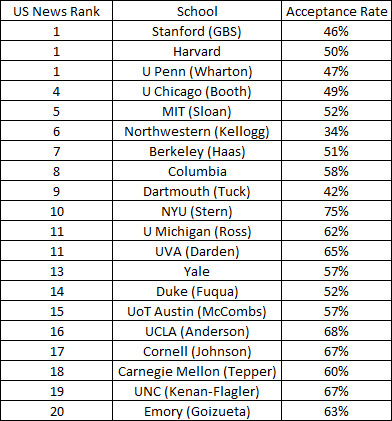
Interview acceptance rate for Stanford, Harvard, Wharton, Booth, MIT, Kellogg, Hass, Columbia, Dartmouth, NYU, Ross, Darden, Yale, Duke, McCombs, Anderson, Cornell, Tepper, Kenan-Flagler, Emory
The acceptance rate ranges from 34% to 75% for schools in the top 20. The average MBA interview acceptance rate for the top 10 is 50% and it is 62% for schools ranked 11 to 20.
MBA Interview Acceptance Rate Rankings from Highest to Lowest
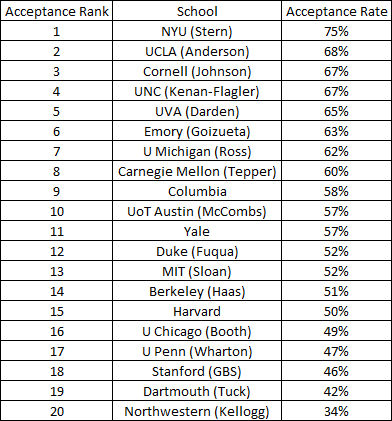 NYU jumps out as the highest acceptance rate by a wide margin. If you have been selected to interview at Stern then you can prepare to open a bottle of champagne because you are probably going to business school. No other school in the top 10 has an interview acceptance rate above 60%.
NYU jumps out as the highest acceptance rate by a wide margin. If you have been selected to interview at Stern then you can prepare to open a bottle of champagne because you are probably going to business school. No other school in the top 10 has an interview acceptance rate above 60%.
On the other end of the spectrum is Kellogg and Tuck with the lowest acceptance rates. These two schools will allow anyone who visits campus to interview, so it is not surprising that they admit significantly fewer applicants who are interviewed. Most of the top 10 schools have an acceptance rate clustered between 46% and 51%.
Duke has the lowest acceptance rate for a school not in the top 10 at 52%. The rest of the schools range from 57% to 68%,
Good luck and don’t forget to prepare for your MBA interviews!
MBA Summer Internship
I haven’t posted anything in the past month because I have been busy interviewing for my summer internship. I interviewed with 14 different consulting companies and am happy to say that I have already received 3 offers and am waiting to hear back from a few others. Getting your first offer is the greatest feeling in the world. I can feel my stress melting away.
If you think it is stressful waiting to hear back from business school just you wait for internship interviews. At least with business school you have only invested a thousand or so on applications and a bunch of time studying for the GMAT and filling out applications. For career switchers who need an internship in their industry, we gave up our high paying jobs and $200K in tuition and expenses to gamble in getting our dream job.
The good news is that business school does a good job of preparing you for interviews. I wish I could go back to undergrad and teach myself how to interview.
I will start posting regularly again now that I have more free time.
Stern Interview Acceptance Rate Analysis
I know that the final decisions for applicants who were interviewed for New York University’s business school are expected soon. I decided to perform a Stern interview acceptance rate analysis to see if I could predict the chance of acceptance for applicants who were invited to interview. From my data sample 74% of applicants who were invited to interview were ultimately accepted.
Stern Interview Acceptance Rate by GMAT
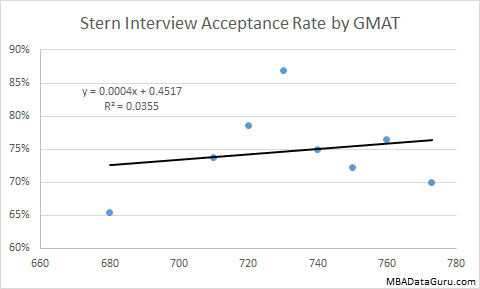 Not only is the slope of the regression line very flat, but also the the R-squared is only 3%. These two pieces of information suggest that once a candidate is invited to interview, their GMAT has no impact on acceptance rate.
Not only is the slope of the regression line very flat, but also the the R-squared is only 3%. These two pieces of information suggest that once a candidate is invited to interview, their GMAT has no impact on acceptance rate.
Stern Interview Acceptance Rate by GPA
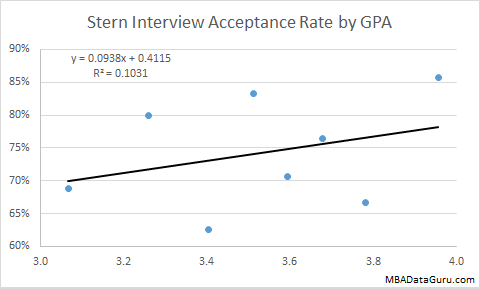 The slope of the GPA graph is a little steeper than the GMAT graph slope. The R-squared is also higher, coming in at 10%. Once again, this indicates that GPA has a little more impact on your chance of admission after being invited to interview compared to GMAT.
The slope of the GPA graph is a little steeper than the GMAT graph slope. The R-squared is also higher, coming in at 10%. Once again, this indicates that GPA has a little more impact on your chance of admission after being invited to interview compared to GMAT.
The low R-squared of the GPA and GMAT compared to admissions for interviewed applicants suggest that NYU treats all applicants as equal once they are invited to interview. If interviewed you are on equal footing compared to all other candidates invited to interview. This is different compared to Ross, which has a much higher correlation between GMAT / GPA and acceptance rate. The GMAT & GPA acceptance rate R-squared ranged from 30% to 75% for Ross, which is much higher than the 3% to 10% for Stern.
The data used for this post comes from GMAT Club.
Ross Interview Acceptance Rate Analysis
Earlier today I posted the Ross acceptance rate analysis which shows how GPA and GMAT scores affect your chance of admission at University of Michigan’s MBA program. I received a request to see if GMAT and GPA can still predict acceptance rate out of the applicants who were selected to interview. I would never want to disappoint a reader, so here is my Ross interview acceptance rate analysis. While reading this analysis, keep in mind that around 62% of interviewed applicants are accepted, which is higher than schools like Harvard and Wharton but lower than Stern.
Ross Interview Acceptance Rate by GMAT
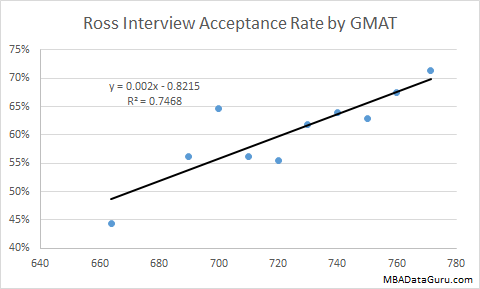 In the graph above you can see that there is a clear relationship between Ross acceptance rate even among the applicants selected to interview. The R-squared is 74% which is fairly high, so GMAT is an accurate predictor of admissions post interview. The slope of the line suggests that for every 10 points higher your GMAT is, you have a 2% higher chance of admissions. Unfortunately for those with a low GMAT score, you are not on an equal playing field even after being selected for an interview at Ross.
In the graph above you can see that there is a clear relationship between Ross acceptance rate even among the applicants selected to interview. The R-squared is 74% which is fairly high, so GMAT is an accurate predictor of admissions post interview. The slope of the line suggests that for every 10 points higher your GMAT is, you have a 2% higher chance of admissions. Unfortunately for those with a low GMAT score, you are not on an equal playing field even after being selected for an interview at Ross.
Ross Interview Acceptance Rate by GPA
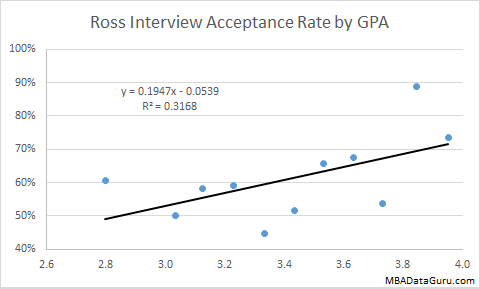 There is also a relationship between Ross interview acceptance rate and GPA, but the correlation is much weaker. Just from looking at the graph you can see that the data is more spread out from the regression line. The R-squared of 32% is much lower than the R-squared for GMAT of 74%. All else equal, it would help your chance of admission if you have a high GPA, but it does not seem to matter as much as GMAT.
There is also a relationship between Ross interview acceptance rate and GPA, but the correlation is much weaker. Just from looking at the graph you can see that the data is more spread out from the regression line. The R-squared of 32% is much lower than the R-squared for GMAT of 74%. All else equal, it would help your chance of admission if you have a high GPA, but it does not seem to matter as much as GMAT.
When I analyzed Harvard Business School acceptance rate, I found that GMAT and GPA could not predict acceptance rate from the pool of applicants selected to interview. Which means everyone who was interviewed were on a level playing field once invited to interview. That does not seem to be the case for Ross. In the end, even with a low GMAT or GPA, you still have a 50% of being accepted after your interview. All you can do is prepare for your Ross MBA interview as much as possible and hope for the best.
Tuck Admissions Analysis
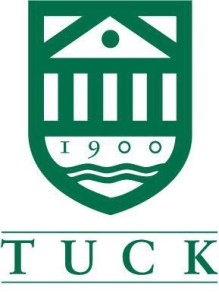 The final decision for the Tuck MBA January round applications is being released tomorrow. Tuck calls the students who have been accepted either the day of or the day before the decision is released. Today, mostly international acceptance calls were made, and I have not been called yet. I am based in the US so I am not super nervous yet, but I am finding it difficult to think of anything other than the Tuck decision. I was incredibly unproductive at work today because I spent the entire time hoping my phone would ring. To help ease my worries I created this elaborate Tuck admissions analysis to try to figure out my chances of getting in. Each of the following graphs are only acceptance rate vs. one variable. In reality there are probably interaction effects between different variables, so this is by no means especially accurate, but my final conclusion is that I have a 53% chance of being admitted. I was hoping the number would come out higher, but it is a lot better than the 20.8% acceptance rate overall at Tuck.
The final decision for the Tuck MBA January round applications is being released tomorrow. Tuck calls the students who have been accepted either the day of or the day before the decision is released. Today, mostly international acceptance calls were made, and I have not been called yet. I am based in the US so I am not super nervous yet, but I am finding it difficult to think of anything other than the Tuck decision. I was incredibly unproductive at work today because I spent the entire time hoping my phone would ring. To help ease my worries I created this elaborate Tuck admissions analysis to try to figure out my chances of getting in. Each of the following graphs are only acceptance rate vs. one variable. In reality there are probably interaction effects between different variables, so this is by no means especially accurate, but my final conclusion is that I have a 53% chance of being admitted. I was hoping the number would come out higher, but it is a lot better than the 20.8% acceptance rate overall at Tuck.
Tuck Admissions Analysis
The first variable I looked at was GMAT. I did a scatter-plot by acceptance rate and found the best trendline for fitting the trendline. This line has an R squared of .82, which is a fairly strong correlation. I then created the smoothed out graph below, which probably does a better job of estimating the impact of GMAT on your application odds.
My 770 on the GMAT really helped to boost my Tuck admissions chances since it is significantly higher than the 718 average. However, I know my GPA is below the average Tuck GPA of 3.5. So next I looked at how GPA impacts acceptance rate.
For Dartmouth, GPA is highly correlated with chance of acceptance, as one would expect. The GPA scatter-plot has a .89 R squared, which is very high. However, the line is not nearly as steep as it is for GMAT. Similar to GMAT, I smoothed out the curve to account for noise and came up with the graph below.
After GPA, I looked at how your industry impacts your chances of getting into Tuck. I only included an industry if it either had a high number of applicants or had a very high acceptance rate, like Venture Capital and Commercial Banking. I lumped all other industries into “other”. The trends for Dartmouth are similar to what I saw in my Wharton industry analysis. Manufacturing fared better with Tuck, but it is still significantly below average.
Finally, I looked at Dartmouth acceptance rate by years of work experience. The results of this graph do not seem to be as conclusive as other variables. The acceptance rate kind of jumps around. My interpretation is that in general the more years of work experience, the higher your chance of admissions is, until you reach 9+ years. Then the admissions committee starts to wonder why you are even applying for an MBA.
All in all, my predicted chance of getting into Dartmouth is pretty decent at 53%. My chance is theoretically a little better than a flip of a coin. I know that very few people who don’t do a applicant initiated interview are invited to a Tuck interview. An admissions committee member told me that roughly 55% of applicants self-initiate interviews, and I am going to guess that only 5% of total applicants are invited. If this is correct, then the fact that I already interviewed means that I have a pretty good chance of getting in. On top of that, I had one recommender who wrote an amazing recommendation for me. I sent it to NYU, Wharton and Tuck. I was admitted to NYU and I have been interviewed at Wharton and am waiting for my final decision. I was rejected from every school that he didn’t recommend me at. I am hoping the trend continues that I get into every school that my super recommender submitted to.
For those of you who are still waiting for the Tuck admissions decision, I hope that this article is able to distract you for a little while while you wait for the decision tomorrow. I wish everyone the best of luck.
The data used to create this Tuck admissions analysis is from GMAT Club. I used the data from the class of 2014, 2015 and the first two rounds of the class of 2016.
Tuck Interview Preparation Guide
Tuck interviews are typically 30 to 45 minutes. Typically, the interviewer is a second year student, but on occasion you will be interviewed by an admissions staff member. Unlike most schools, Tuck allows anyone who visits campus to interview. Since Tuck is in a very remote location in New Hampshire, Tuck wants to see that you are committed to the school and are willing to travel to campus. Tuck does extend interview invites to a few select candidates who did not self-initiate an interview, but it is very rare. A member of the admission committee told me that slightly over half the candidates self-initiate an interview.
I highly recommend you self-initiate an Tuck interview on campus, because if you don’t then you put yourself at a huge disadvantage. While visiting campus, visit a class and go on a tour. It is a great way for you to gather material for your essays.
Here is a list of the most common questions asked during a Tuck interview. I also included the probability that each question is asked based on Clear Admit interview reports.
Tuck Interview Questions
- Why Tuck? – (100%)
- Walk me through your resume – (82%)
- Do you have any questions for me? – (76%)
- What are your short-term and long-term goals? – (71%)
- Why an MBA or why now? – (65%)
- Tell me about a challenge, conflict or difficult situation at work? How did you deal with it? – (59%)
- What is the accomplishment you are most proud of? – (29%)
- What kind of leader are you or how do you interact in a group? – (29%)
- What extracurricular activities do you plan to participate in at Tuck? – (29%)
- What are your three biggest strengths? – (29%)
- What is your biggest weakness, or three biggest weaknesses? – (29%)
- What would you contribute to Tuck? – (29%)
- Tell me about yourself – (18%)
- Are there any questions you wish I had asked you? – (18%)
- What are your other interests or passions? – (18%)
- If you attend Tuck, how would your classmates describe you? – (12%)
I interviewed back in December and most if not all of the questions I was asked are on this list. My Tuck interview was with a second year student. He was friendly and laid back. We chatted a little before and after the interview.
Check out my new MBA Interview Guide.
Sloan Interview Preparation Guide
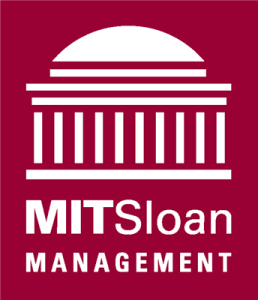
At this point all of the Sloan interview invites have been sent out for this year. Unfortunately, I did not receive an invite from Sloan, but I am happy to say that due to all of my preparation, my Wharton interview went very well. Although the team based discussion is a new interview format, I was able to assume a leadership role without being aggressive or obnoxious about it. Since I had already started preparing for a Sloan interview incase I got an invite, I decided to post the Sloan interview preparation I was working on for myself. I hope this is helpful for those who will be interviewing with sloan over the next few weeks. Sloan interviews can take place on campus, in hub cities or even at the offices of alumni. Most Sloan interviews last 40 to 50 minutes, but some have been as short as 15 minutes. I have listed out the questions found in Clear Admit over the past 2 or 3 years in order from most common to least common. The number to the right indicates how many times it was asked.
Sloan Interview Questions:
- Why MBA? (5)
- Describe a time I had to resolve a conflict. (5)
- Anything new to add to your resume since submitting application? (4)
- Why Sloan? (4)
- What do you me to get across to the admissions committee about you? (3)
- Questions? (3)
- Tell me of a time you received feedback and how did you respond? (3)
- Tell me about a time you helped a colleague who was struggling professionally. (3)
- Tell me of a time when you had to mentor someone. (3)
- Describe a time when one of your ideas was rejected and what you did. (3)
- Why get an MBA now? (2)
- Tell me about a time you had to persuade your colleagues. (2)
- Walk me through your resume. (2)
- Describe a time when you had to rally a team (2)
- Describe a major initiative that you have worked on. (2)
- What would your recent team members say about you, if they were asked what its like to work with you?
- Tell me about a company in your industry that has caught your eye.
- Given your role at your company (work for a startup), what will it be like when you leave?
- Describe a time when you took a big risk.
- Elaborate on your leadership role in your extracurricular activity.
- Why did you change jobs from (company x) to (current company)?
- You have an offer from (current company) to return. Do you intend on taking it?
- Explain what your prior employer does, your contributions there and why you decided to move to your current job.
- Will you return to your employer after graduation?
- Describe a time when you had to say “no” to a boss.
- Tell me about your biggest achievement.
- Did you talk to someone about the Sloan program?
You will be in good shape if you prepare for the 10 to 15 most common questions. It may be helpful to look at the questions that have only been asked once, but I would not spend too much time prepping for them. For more info on preparing for a Sloan interview, check out my MBA interview preparation guide.
Few MIT Interview Invites for Round 2
Similar to many of the applicants on the GMAT Club forum I have been impatiently waiting to hear from Sloan about an interview invite. It seemed to me that the number of invites have been very low so I decided to take a quick look at how low. I put together two charts, one based on the front page statistics and one based off of the table you can download with detailed stats.
For some reason the two sets of numbers do not tie together but they tell the same story. Even though the Sloan interview invite period is more than half over, only 14% of the estimated interview invites have been sent out. My best guess is that the weather has been even worse than normal in Boston this year and has significantly delayed MIT. It is really hard for me to stay positive as the invite deadline quickly approaches, but given the numbers, I think we should all stay positive. It will be interesting to see if Sloan misses the invite deadline for R2 in addition to missing it for R1.
Wharton Interview Preparation Guide
 Check out my updated Wharton MBA Interview Questions and preparation guide for the most up to date list of questions.
Check out my updated Wharton MBA Interview Questions and preparation guide for the most up to date list of questions.
Now that I have been invited to a Wharton interview, I am spending as much time as I can prepping for interview. In the spirit of teamwork and cooperation, I’ll share with you the most common Wharton interview questions I found on Clear Admit. I only included questions from interviews that happened in the past two years, since the Wharton interview format changed. I don’t think that the older interviews are relevant anymore. If questions were asked to more than one person on a Clear Admit interview report then I put the number of times in parentheses.
Wharton Interview Questions:
1) Describe your views of the Team Based Discussion. (7)
2) Do you have any questions for me? (6)
3) Do you have any updated to your application? (4)
4) What extracurricular at Wharton? (4)
5) Was your behavior in the Team Based Discussion representative of the way you typically act in a group setting? (4)
6) Walk me through your resume. (4)
7) Why MBA? (2)
8) What could you have done differently as a team? (2)
9) Why Wharton? (2)
10) Tell me about a time you had to persuade others. (2)
11) What are your post MBA goals? (2)
12) What specific quality or qualities do you hope to hone at Wharton?
13) Tell me about one time you had to overcome an obstacle working in a group and what you would do differently if you had to do it again?
14) Tell me about a time you failed and what you learned.
15) What are the 3 top qualities you think a leader should have?
16) What are 3 qualities you look for in a business school, especially our school
17) Why now?
18) What do you do in free time?
19) Tell me about a time you faced a leadership challenge.
20) Tell me about a time when you worked in a group in which everyone did not agree and how did your team resolve the situation?
21) What do you think worked well in the Team Based Discussion?
It seems that pretty much everyone is asked how they thought the team based discussion went and everyone is given the chance to ask questions at the end. Beyond that there are four other questions that are asked frequently, which you should prepare for. Good luck in your Wharton interview! Check out my MBA Interview Preparation Guide for more tips.

